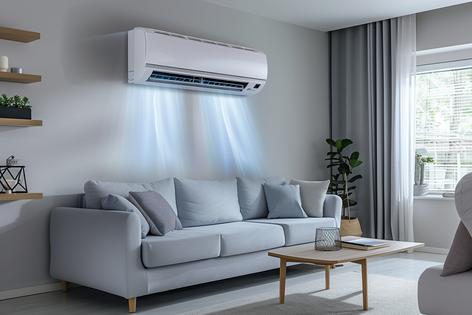How Smart Air Conditioning Can Save You Money on Energy Bills
Published in Home Articles
Smart air conditioning (or smart AC controllers) represents a significant leap forward from traditional air conditioners. Unlike standard setups that operate on fixed schedules or continuous run-times, a smart air-conditioning system incorporates advanced technologies such as IoT (Internet of Things) connectivity, sensors, infrared signals, and artificial intelligence to optimize its operation. These systems can adjust the cooling based on real-time data like room occupancy, external temperatures, and individual preferences.
The adaptability of smart air conditioning not only enhances comfort but also offers substantial energy savings. By efficiently managing energy use and reducing waste, smart AC units can help you experience a noticeable decrease in your energy bills. And if you're an eco-conscious homeowner, you might find these smart home devices an attractive investment.
Traditional Air Conditioning
Just a brief background on the current technology: a traditional air conditioner circulates refrigerant between two sets of coils—one inside the home and one outside. This process absorbs heat from indoor air and expels it outside, thereby cooling the air within the home. These systems are typically controlled through manual thermostats or simple on/off scheduling, leading to constant operation during hot weather, irrespective of actual cooling needs.
However, these systems often suffer from several inefficiencies. First, they cannot adjust the cooling based on real-time occupancy or specific room temperatures, usually cooling empty rooms unnecessarily. Additionally, most traditional air conditioners do not have the capability for remote management, meaning they cannot be adjusted or turned off when no one is home unless they are manually set beforehand.
This 'all-or-nothing' approach contributes to significant energy wastage, as the air conditioning runs at full capacity even when minimal cooling would suffice. These limitations highlight the need for more adaptive and energy-efficient solutions in home cooling technology, such as those offered by smart devices firms like MyPlaceIQ.
Take Charge of Your Energy Bill
Smart air conditioners can reduce energy bills by optimizing how and when air conditioning is used. Here’s how they achieve these savings:
Zonal Control
Unlike traditional systems that cool entire homes regardless of which rooms are in use, a smart air conditioner enables zonal control. This means you can selectively cool specific areas or rooms based on occupancy. For example, at night, you might choose to cool only the bedrooms. This targeted approach prevents energy wastage on unoccupied spaces, leading to substantial savings.
Automated Scheduling
A smart air conditioner can be programmed with schedules that align with your daily routine. Setting your system to activate shortly before you arrive home ensures a comfortable environment when needed and remains off when the house is empty. This automated scheduling avoids the inefficiency of leaving the air conditioning running all day, thus reducing energy costs significantly.
Remote Access
With remote access or remote control capabilities, homeowners can use a smartphone or tablet to control their air conditioning from anywhere. This flexibility allows for adjustments on-the-fly, such as turning off the system if you forget when leaving home or adjusting settings based on weather changes. Remote access ensures that your air conditioning is used only when necessary, enhancing energy conservation.
Settings for Energy Efficiency
A smart AC unit has sensors that detect real-time environmental variables such as humidity and outside temperature. These systems adjust their settings for optimal performance with minimal energy use. For instance, on cooler days, the system might use less intensive cooling or switch to a fan mode, conserving energy while maintaining comfort.
Maintenance Alerts
Regular maintenance is crucial for air conditioning efficiency. Smart systems can monitor their own performance and alert homeowners when filters need changing or if there are any issues that might hinder efficiency. These proactive alerts help maintain the system in optimal condition, ensuring it runs efficiently and preventing minor problems from developing into major, costly repairs.
Learning Algorithms
One of the most advanced features of air conditioning in smart homes is its ability to learn from your preferences and behaviors. Over time, these systems can automatically adjust their operations to match your typical patterns, such as reducing cooling or fan speeds when you're not home or adjusting temperatures for different times of the day. This learning capability ensures that the system is always tuned to provide comfort with the utmost efficiency.
The initial investment in a smart air conditioning system can be offset by the energy savings accrued over time. It can be a wise choice for eco-conscious homeowners looking to optimize their home's energy use.
Conclusion
Smart air conditioning offers enhanced energy efficiency, personalized comfort, and significant energy savings, making it a sensible decision for the modern homeowner. You not only optimize energy use, but you also embrace a future where smart home systems work seamlessly to improve your daily life.






























Comments